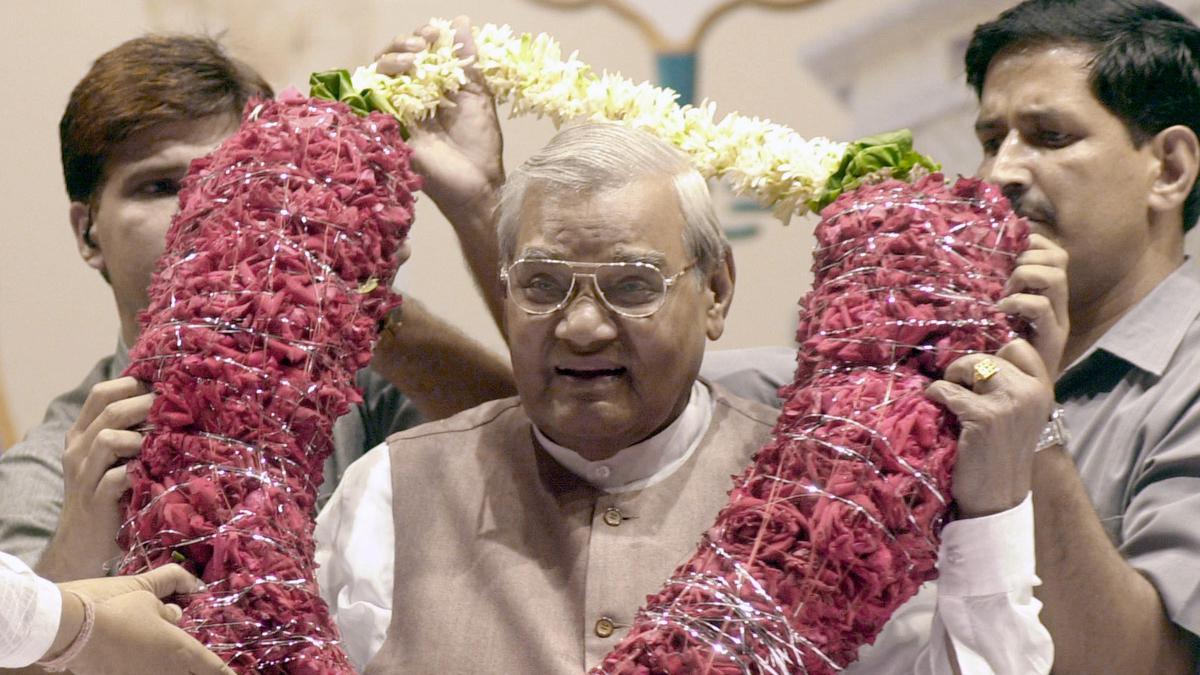
Elections that shaped India | The Vajpayee years Premium
The Hindu
Atal Bihari Vajpayee's political journey, from Jan Sangh to Prime Minister, reshaped Indian politics and diplomacy.
Atal Bihari Vajpayee held the post of prime minister for three non-consecutive terms in 1996, 1998-99, and from 1999-2004, although he had been involved in public life since 1957. He was elected 10 times to the Lok Sabha from four different States and was also a member of Rajya Sabha twice.
In his late teens, he was involved with the Quit India Movement in 1942. He was one of the founders of Jan Sangh in 1957, the right-wing organisation that merged with several other parties to form the Janata Party during the 1975 Emergency period. Jan Sangh also played a crucial role in shaping modern-day BJP, often considered its successor.
Mr. Vajpayee was appointed the Minister of External Affairs after the 1977 Lok Sabha election, where Janata Party emerged victorious. In 1984, the newly founded BJP could win only two seats, and its leaders decided to throw their weight behind the Ram Janmabhoomi movement. It paid off, and Mr. Vajpayee emerged as the prime ministerial candidate in 1995. In 1996, he led a 13-day government.
The 1998 Lok Sabha elections were held three years ahead of schedule after I.K. Gujral’s government collapsed. With the support of regional parties like Jayalalithaa’s AIADMK and Telugu Desam Party, Mr. Vajpayee was sworn in again as the prime minister in March 1998, this time for 13 months. But in those 13 months, he achieved some significant landmarks to add to his legacy.
Soon after taking over as the prime minister, Mr. Vajpayee oversaw the Pokhran nuclear test in May 1998. Popularly called Pokhran II, the series of five nuclear tests conducted at Indian Army’s Pokhran Test Range in Rajasthan was the country’s second attempt at nuclear tests. (The first one was done under Indira Gandhi in 1974.)
Pokhran II was followed by a slew of international sanctions. The tests shocked the world, primarily because of the secretive mannerin which they were conducted. India-U.S. relations hit rock bottom, but Indian diplomacy under Mr. Vajpayee and his Foreign Minister Jaswant Singh eventually prevailed. Mr. Singh conducted talks with the U.S. Deputy Secretary of State Strobe Talbott on nuclear policy, including threat perception and future security plans. Although India did not sign the Comprehensive Nuclear Test Ban Treaty, against the wishes of the U.S., it declared a moratorium on testing; agreed to join the Fissile Material Cut-off Treaty negotiations without halting fissile material production; reaffirmed minimum deterrent without giving any number of warheads; and agreed to strengthen export controls. India also declared a no-first-use policy and commitment to disarmament. Following the negotiations, U.S. President Bill Clinton visited India in March 2000 — the first President to do so in 22 years— thus solidifying a diplomatic win for Mr. Vajpayee, aided by Mr. Singh.
Also read | The Janata Parivar in electoral politics: a timeline

The girl, who was admitted to Aster CMI Hospital with alarming breathlessness and significant pallor, was diagnosed with Wegener’s Granulomatosis (now known as Granulomatosis with Polyangiitis or GPA), a rare autoimmune condition that causes spontaneous bleeding in the lungs, leading to acute respiratory failure.

ACB files case against IPS officer N. Sanjay in Andhra Pradesh. The official is accused of manipulating the tender processes for awarding contract for development and maintenance of AGNI-NOC portal, and conducting awareness meetings for SC/STs. It is alleged that the total value of properties stolen, or involved in the case is estimated at ₹1,75,86,600.









